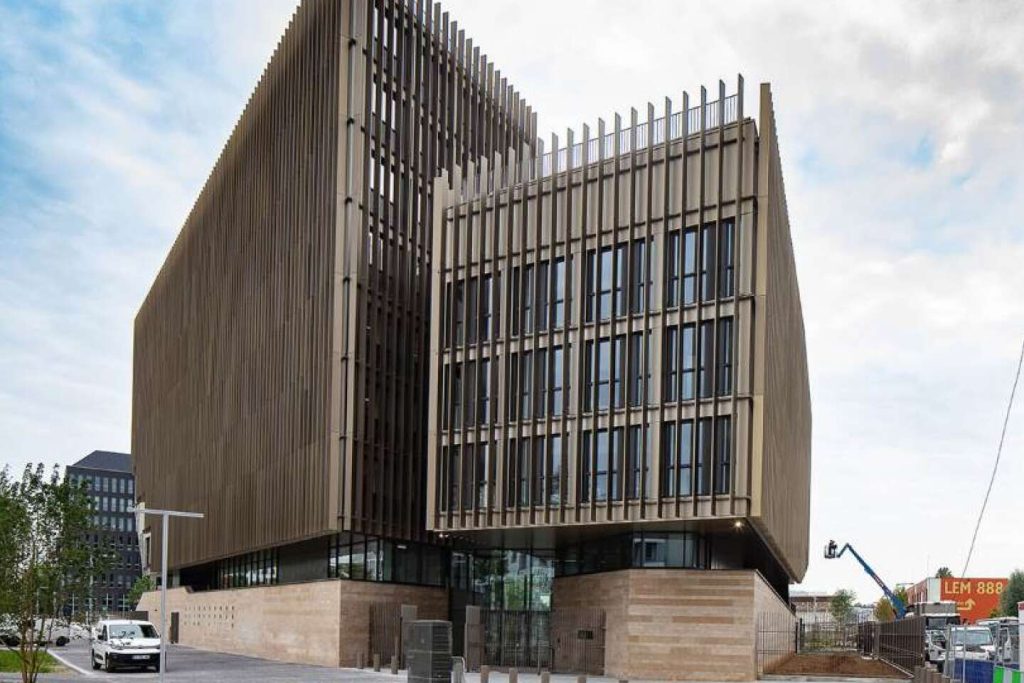Police forces intervened on Wednesday, May 15, at the premises of the School for Advanced Studies in the Social Sciences (EHESS) in Aubervilliers (Seine-Saint-Denis) to end an occupation by pro-Palestinian activists, according to sources. The mobilization had started on Monday. The police intervened in the late afternoon to evacuate “about forty people,” according to the Paris Police Prefecture. The operation lasted just under two hours and was carried out without incident. The school’s administration indicated in an internal message that the reopening of the affected building on the Condorcet campus, which will remain closed on Thursday, would be communicated to students and staff “in the coming days.”
According to a representative of the staff syndicated at Sud-Recherche, Victor Deroin, around forty policemen and gendarmes entered the premises to remove about thirty students present since Monday. A mobilized student described the evacuation as unjust, stating that the occupation had been peaceful from the beginning, with the sole purpose of urging the administration to take a position regarding a ceasefire in Gaza. The student mentioned that discussions had been organized over three days, both in the hall and inside the building, all proceeding calmly. In response to similar actions on American campuses, various protests have been taking place in France in recent weeks, mainly centered around Sciences Po sites. These actions have sparked political debates during the European election campaign and have led to repeated interventions by law enforcement, including at Sciences Po Paris and the Sorbonne.
The intervention by police forces at EHESS is part of a larger wave of mobilizations against the conflict in Gaza. Activists are calling for institutions to take a stand on the issue and take a stance for peace. The incident at EHESS is not isolated, as similar actions have taken place at other universities in Europe, fanning the flames of political discussions and activism. These protests come at a crucial time, with the European Parliament elections underway, shining a light on the impact of international conflicts on local communities. The disruption caused by these events reflects the deep-rooted concerns and passions surrounding the ongoing conflict in the Middle East.
The involvement of law enforcement in resolving the occupation at EHESS highlights the complex dynamics of protest movements and the response by authorities. The clash between activists and authorities underscores the tensions and disagreements that arise in times of conflict. The peaceful nature of the occupation, as claimed by the students, raises questions about the use of force in resolving such situations. The ongoing discussions and debates within academic institutions like EHESS show the importance of creating spaces for dialogue and engagement with pressing global issues. As the situation in Gaza continues to unfold, the actions and reactions of students and activists shed light on the significance of solidarity and advocacy in times of crisis.
Overall, the intervention at EHESS reflects a larger pattern of mobilizations and protests across Europe in response to the conflict in Gaza. The actions taken by students and activists demonstrate a commitment to raising awareness and calling for peace in the face of violence and conflict. The encounters between protesters and authorities highlight the challenges and complexities of navigating political discussions and activism in a climate of tension and uncertainty. As the debate continues to evolve, it is important to recognize the efforts of those advocating for change and standing in solidarity with affected communities. Through dialogue and engagement, meaningful progress can be made towards achieving peaceful resolutions to international conflicts.


